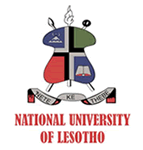 KEY PERSONNEL: Professor K.D. Mogobe (PI/PD and Co-Finance Administrator), Ms. Ntsoaki Ralejoana (Co-Finance Administrator and Logistics Coordinator), Mr. Lebajoa Mphatsi (eLearning Coordinator)
KEY PERSONNEL: Professor K.D. Mogobe (PI/PD and Co-Finance Administrator), Ms. Ntsoaki Ralejoana (Co-Finance Administrator and Logistics Coordinator), Mr. Lebajoa Mphatsi (eLearning Coordinator)
PROJECT TITLE: STRIPE HIV – NUL
PROJECT YEAR 1 RECAP: NUL partnered with SCOTT School of Nursing and the National Health Training College (NHTC) to train 9 facilitators and 43 learners through one training of trainers and two STRIPE HIV workshops. Diverse cadres of pre- and post-service learners were represented, including doctors, nurses, pharmacists, and lab technicians. Lesotho has a high burden of HIV. The goal of STRIPE HIV was to help reduce the burden by empowering communities of practice, health professionals, and people living with HIV.
PROJECT YEAR 2 SUMMARY: National University of Lesotho trained 7 facilitators and 365 learners through two training of trainers and 16 STRIPE HIV workshops covering 7 modules. Diverse cadres of pre- and post-service learners were represented, including nurses, midwives, pharmacists, nutritionists, and counselors. Student leaders used WhatsApp to communicate with learners regarding training dates and certificate requirements. Workshops were conducted virtually due to the COVID-19 pandemic, which allowed for technological skill building among learners and facilitators.
MAIN ACCOMPLISHMENTS
- Trained 7 facilitators to facilitate 16 workshops
- Trained 365 learners
- Adapted to COVID-19 pandemic by conducting trainings virtually
- Assisted CHAL Roma College of Nursing and the Government National Health Training College in budget and recruitment process for Mentorship Initiative
- Currently working on a manuscript about the project
CHALLENGES AND SOLUTIONS
- The COVID-19 pandemic limited participation among facilitators due to vaccination responsibilities. To address this limitation, two facilitators, the PI/PD, Training Coordinator, Logistics Manager, and eLearning Coordinator were trained and facilitated workshops.
- Learners initially had insufficient data to complete trainings. Funds were re-allocated in the budget to cover this need.
- Unstable internet connection limited participation among some learners. Unfortunately, this could not be resolved.
TRAINING PARTNERS
- CHAL Roma College of Nursing
- Government National Health Training College
PARTICIPATING CLINICAL SITES
Post-graduate learners were recruited from 4 clinical sites, all of which receive PEPFAR support:
- National University of Lesotho
- Berea Hospital (Government)
- Paray Hospital (CHAL)
- Thaba Tseka Health Division (Government)
IMPLEMENTATION
- Training Cohorts: 8
- Facilitators Trained: 7
Facilitators included nurses, pharmacists, laboratory scientists, and counsellors.
- Learners trained: 356
|
Nursing/Midwifery |
Pharmacy |
Laboratory |
Other |
Total |
|
|
Preservice |
17 |
1 |
0 |
13 |
31 |
|
Postgraduate |
174 |
95 |
0 |
56 |
325 |
|
Total |
191 |
96 |
0 |
69 |
356 |
INNOVATING HIV TRAINING DURING COVID-19: The project was moved to a virtual format to control the spread of COVID-19. A noted challenge was that COVID-19 vaccination limited participation because many health workers were deployed for these the vaccination efforts. As a result, two of seven trained facilitators were available to facilitate workshops for learners.
BROADER IMPACT: Learners and facilitators built technological skills while implementing STRIPE HIV virtually that will impact other areas of teaching. Project staff have engaged with health authorities in two districts about the benefits of STRIPE HIV. Enthusiasm was shown for the idea of participating in future virtual training workshops. STRIPE HIV also enhanced achievement of the NUL strategic goal of being a regional and international player by developing collaborative partnerships and cultivating an international profile.
IMPACT VIGNETTES
- “Virtual learning increased the technological skills of educators/facilitators of stripe.” – Project staff member
- “The curriculum was user friendly. Participants could study on their own even after the class sessions were over.” – Project staff member
- “Participants at the end of each module, expressed appreciation of each other as professionals, acknowledged that they needed each other for better performance while dealing with patients. They learnt a lot from each other.” – Project staff member
- “My knowledge on dealing with HIV patients or patients at risk has improved” – Learner
- “There was coordination among participants and the training was highly interactive. Everybody helped each other and help improve each other wherever the person was lacking” – Learner
- “I gained knowledge regarding HIV through the STRIPE training which improved my competency when it comes to dealing with HIV related issues. this will help me improve quality of care delivered to patients” – Learner
- “The training positively affected me as I am now enthusiastic to help everyone in need of health services more specially people with HIV and those at risk.” – Learner







